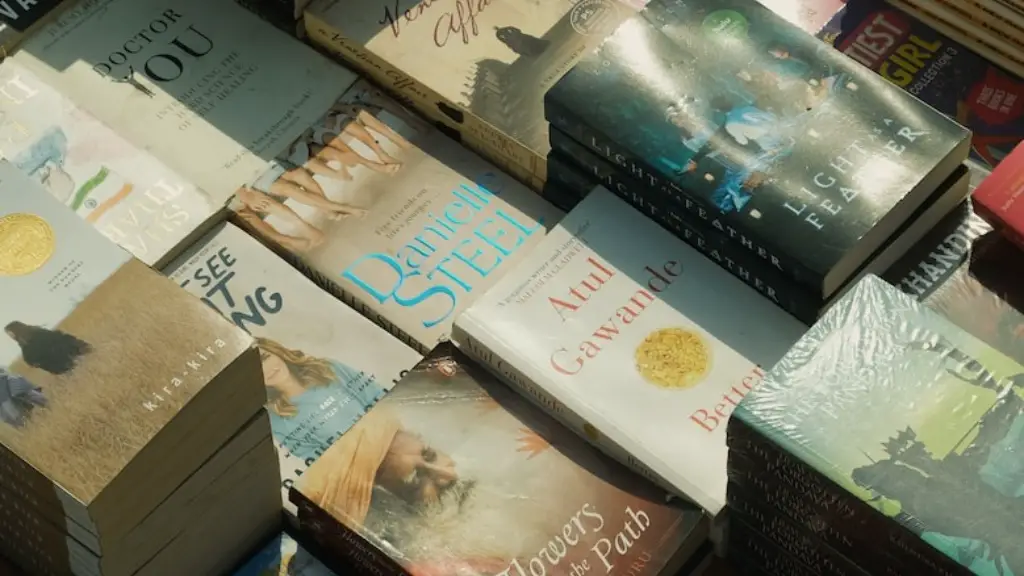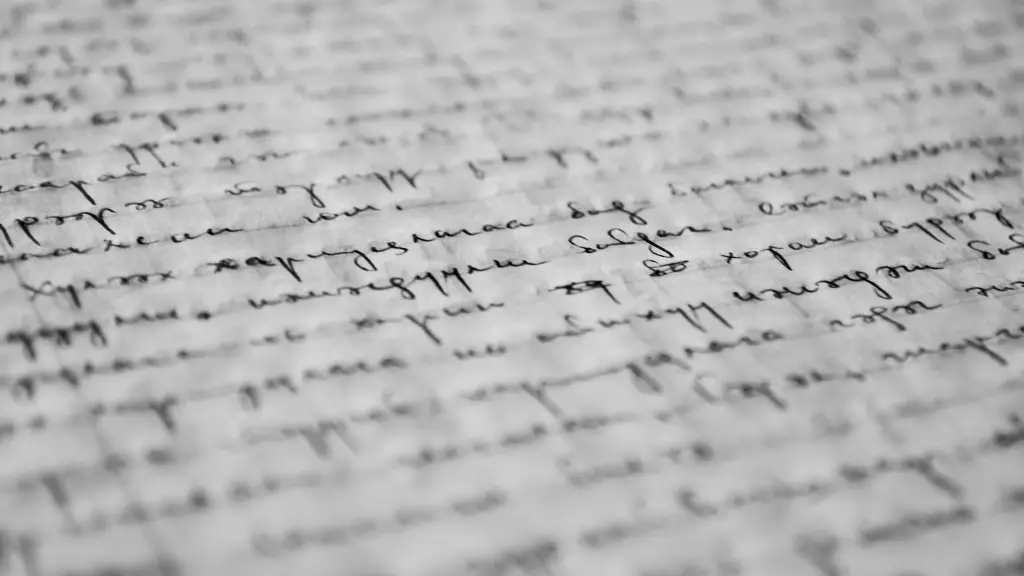What is poetry used for? Poetry is a much-loved art form that has been present in society in various forms for centuries. People use poetry to express ideas, express emotions, and to provide comfort. Through poetry, we can explore our feelings and memories, be creative and write stories, and ultimately, comprehend the world a little better.
At its core, the purpose of poetry is to evoke emotion in its audience. Poetry can be an effective way to provide a unique experience since it has no limitations on expression. For this reason, people often use poetry to explore emotions that may be difficult to express in other ways. Whether someone is trying to come to terms with a difficult experience, or simply wants to provide comfort, poetry can be a powerful tool for expression.
Poetry can also provide a unique perspective on certain topics. Through its use of words, tone, and rhythm, poets can transport readers to a different world and open people up to experiencing new ideas. Poetry can be used to discuss taboo topics and push boundaries, allowing for meaningful conversations on difficult and important topics. Expressing these ideas through poetic form can provide a more emotional and powerful way to experience them.
Further, poetry can be a way to express ideas and help create a sense of community. By giving a creative outlet to share stories and experiences, poets can provide emotional support, comfort, and catharses to those who are going through difficult times. Through sharing our emotional experiences, poetry can help to create a sense of understanding, connectedness, and build empathy in a community.
As well, poetry can be used to provide a unique interpretation of historical events, providing fresh perspectives to readers. By exploring stories of the past, poets can give a powerful, emotional representation of the most influential and important moments in life. In this way, poetry can help us to appreciate the past and learn from the experiences of our ancestors.
Finally, poetry can convey our thoughts, stories, and emotions in an effective and comprehensive way. Poetry has the ability to capture the essence of an experience in a single phrase or sentence, making it one of the most powerful and poetic forms of expression. Through the use of vivid language and metaphor, poetry can allow us to go beyond what is spoken and reveal the true emotions and experiences of its author.
Role of Poetry in Society
Poetry is a powerful medium and important tool in our society and deserves recognition for that. By reading and appreciating poems, we can connect with our own thoughts and feelings and come to better understand the experiences of others. Poetry helps to show more compassion for each other and can bring society closer.
In addition, poetry can help to bring about meaningful change in society. Poetry can be used to expose injustices and to bring those causes to light. Activists, artists, and writers can use it as a tool to convey important messages and bring attention to issues that might otherwise go unnoticed.
Not only can poetry be used to create change, many forms also provide access to information that can help us better understand the world around us. Many of the most respected and revered poems of our time have been used to educate communities and share ideas. Through this, poetry has opened our eyes to the world, breaking down barriers and inspiring thoughtful conversations.
Although it may be difficult to measure the impact of poetry on society, its effects are clear. Many forms of art have used the power of poetry in the service of humanity, and this trend is likely to continue. Poetry can be an effective tool in creating meaningful change and inspiring conversations that can bring about progress and understanding in our society.
Cultural Significance of Poetry
Poetry also has wealthy cultural significance, which can be seen through its use in different forms across the globe. Poems have been used in various different cultures to tell stories, express emotions, share wisdom, and provide comfort. Even in the digital age, poetry remains a popular and much-loved form of expression.
In many cases, the roots of poetry can be traced back to the ancient cultures that wrote the first poems centuries ago. These early works established the structures and techniques that are still used by writers today, and the themes of exploration and understanding of the world remain at the core of poetry as well.
Poetry has also been used to facilitate political and religious conversations, both in ancient times and in modern times. From praising gods in ancient religions to criticizing governments in modern times, poets have used their craft to bring attention to their beliefs. Through its power of expressing emotion and ideals, it has been a powerful form of communication.
Finally, poetry has been used to record and share stories for many centuries. From capturing historic moments to honoring the dead, early cultures wrote it all down in poetic forms. In this way, poems have become a valuable source of history, allowing us to learn from our ancestors and look back on the events and emotions that have shaped our societies.
Types of Poetry
Throughout history, cultures and societies around the world have developed different forms of poetry to express their thoughts and feelings. While all poetry shares common elements, each type of poetry has a distinct style and structure. From the use of rhyme and meter to different poetic techniques, each type of poetry offers unique benefits and advantages.
The most common forms of poetry are sonnets, haikus, limericks, free verse, and epic poetry. Sonnets are traditional form of poetry, with a strict structure and pattern of rhyme and meter. Haiku is a Japanese form of poetry, with an emphasis on nature and vivid imagery. Limericks are humorous, often silly poems with a repetitive rhyme structure. Free verse poems consist of unstructured lines with an emphasis on emotion and imagery. And epic poems are large, often narrative poems with a focus on grand stories and mythic themes.
More experimental forms of poetry, such as spoken word, concrete poetry, and sound poetry, have grown more popular recently. Through the use of video and multimedia, spoken word poets can share their work with a wider audience. Concrete poetry focuses on the use of symbols and the visual representation of words. And sound poetry utilizes various noises and sound effects to create a powerful auditory experience.
Ultimately, the type of poetry that someone chooses to write or read is up to them. By exploring the different forms of poetry, one can discover the form that best fits their needs and interests. No matter which type of poetry they choose, they will be rewarded with a unique and powerful experience.
Writing Poetry
Writing poetry can be a wonderful and rewarding experience. By letting go of strict rules of grammar and structure and allowing themselves to express their thoughts, people can open up and explore new ideas that may not have been accessible otherwise.
To get started, it can be helpful to read a variety of poetry and to take it as an opportunity to explore a diversity of styles and structures. By experimenting with different forms, the writer can discover which one works best for them and to see which topics they are passionate about. Once they understand the basics of writing poetry, they can experiment with different techniques and styles until they find the one that works best for them.
When writing poetry, it can be helpful to choose topics that are meaningful to them. Poetry is a powerful way to explore and share emotions, so it is important to write about something that is close to the heart and resonates with the writer. Through writing, they may gain a better understanding of their emotions or of certain topics, and the poem can become a meaningful record of those thoughts.
Finally, it is important to remember that there is no perfect way to write a poem. As with any other form of expression, it is important to allow the poem to develop in its own way and trust in the process. By allowing themselves to explore, poets can create something that is truly unique and meaningful.
Performance Poetry
More recently, performance poetry has become popular as a way to share poetry with an audience. Through the use of spoken word and multimedia, performers are able to bring their work to life in a unique and powerful way.
When performing a poem, it is important to convey the feelings and emotions of the poem to the audience. Through careful pacing and strong delivery, performers can create an energetic and engaging atmosphere. Additionally, by incorporating multimedia, performers can take advantage of the visual aspects of performance and create a truly captivating experience.
To be successful, performers must practice their performance and make sure it is engaging and entertaining. To do this, they must be aware of their audience and make sure their performance resonates with them. It is also important to choose material that is close to the performer, as this will make the performance more meaningful and engaging.
Overall, performance poetry is an effective and powerful way to share poetry with an audience. Through its combination of words, multimedia, and emotion, performers can create an artistic and moving experience for their audience.
Benefits of Poetry
The benefits of poetry are numerous. Through its vivid language and evocative imagery, poetry can provide a unique perspective and help us appreciate the beauty of the world. Furthermore, it can provide comfort and solace during difficult times. For example, a deeper connection can be drawn through powerful lines of poetry which can provide relief to those dealing with a challenging situation.
Additionally, poetry is a wonderful source of entertainment for many. From the hilarious limericks to the profound sonnets, poetry can captivate and intrigue readers, allowing them to experience emotions and ideas in a powerful way.
Moreover, the benefits of poetry extend beyond entertainment. Poetry can also provide us with valuable knowledge and lessons. Through its vivid metaphors and imaginative imagery, it can open us up to new experiences and give us a glimpse into the minds of others.
In conclusion, poetry has many positive benefits. From providing comfort and solace to increasing our understanding of the world, it has no limit on what it can provide. And its ability to move us and connect us with others is truly inexpressible.





